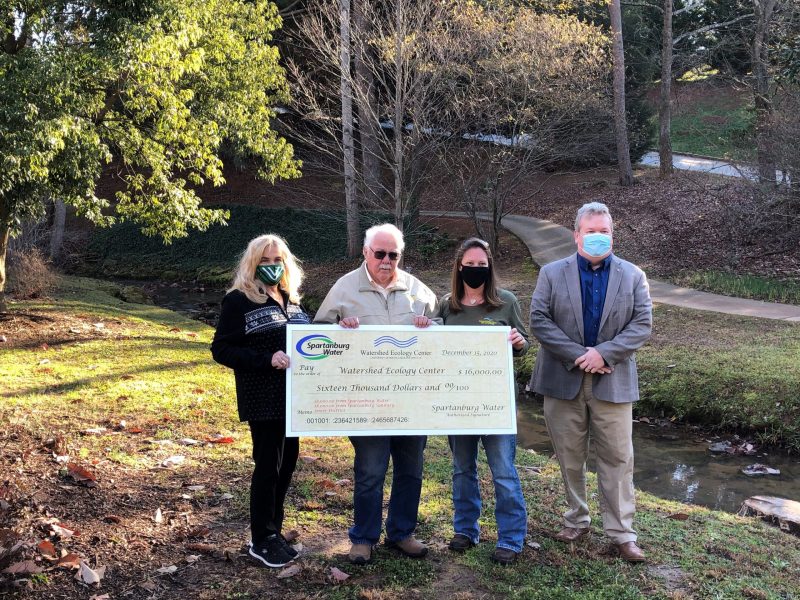Amid pandemic, Spartanburg Water grant aims to support resilient efforts by Watershed Ecology Center to continue education for 22,000 area students
December 22, 2020
Lanita Wilson (WEC Program Director), Dr. Jack Turner (Director of WEC), Beth Button (Community Outreach Coordinator), Ken Tuck (SWS Drinking Water Treatment Manager)
A $16,000 grant by Spartanburg Water will assist USC Upstate’s Watershed Ecology Center in continuing its mission to encourage watershed awareness through education, experience, and community outreach, despite the Coronavirus pandemic.
As we all know, 2020 has been a difficult year. Because of COVID-19, we saw the shutdown of schools, including USC Upstate. Because of this, the Watershed Ecology Center lost about 5,000 student contacts and was unable to hold its traditional summer camp. However, the Watershed Ecology Center adapted, holding virtual camps in place of its traditional face-to-face classes.
“The main difference from the regular classroom visit is the fact that we must send enough supplies for each student, so that there are no shared supplies, causing our supply budget it increase significantly,” said Dr. Jack Turner, Director of the Watershed Ecology Center.
With the Watershed Ecology Center able to continue serving thousands of students, the success of last year, despite COVID-19 restrictions, showcased the resiliency and adaptability of the program to reach children and adults through multi-media formats.
The Watershed Ecology Center’s annual goal for 2021 is to reach 22,000 K-8 Spartanburg County students through watershed-based educational programming, continuing to provide tools to incorporate virtual formats and individual student supplies.
“With this technology, the Watershed Ecology Center intends to bring interactive programs and concepts into the classroom, such as virtual water and wastewater treatment plant tours and the development of ‘virtual field trips’ for various watershed ecosystems – from the mountains to the ocean – using South Carolina as the background,” Turner said.
In addition to expanding the virtual classroom, the Watershed Ecology Center hopes to promote adult programs, including programs on rain barrels and a series of 13 other homeowner-related programs.
A limited amount of Spartanburg Water’s funding will also support the Adopt-A-Stream project. The Center plans to purchase two water sampling kits under the Spartanburg Water name in order to extend monitoring in the upper regions of the Pacolet Watershed in Spartanburg County.
Along with these existing adult programs, when it is safe to resume in-person learning, the Center is looking to broaden its effort to include programs for teachers that will support STEM (Science, Technology, Engineering, and Mathematics) curriculum and equip teachers with the materials needed for hands-on education in the areas of Math and Science.
“Spartanburg Water is proud to once again support all of these efforts by the Watershed Ecology Center – aimed to encourage water conservation, watershed education, water quality, and the study of organisms living within our watershed,” said Spartanburg Water CEO Sue Schneider.
On Tuesday, December 15, 2020, Spartanburg Water presented the Watershed Ecology Center with a $16,000 check. The Commission of Public Works of the City of Spartanburg and the Spartanburg Sanitary Sewer District Commission each contributed $8,000 – proudly securing Spartanburg Water’s partnership and joint environmental education efforts with the Watershed Ecology Center for the 2021 calendar year.
“I would like to thank Spartanburg Water for their continued support of the Watershed Ecology Center and its programs,” Turner said. “We, like most organizations, are being forced to modify our programs. We are trying to continue to provide quality, hands-on and timely, science-based programs to students.”
About Spartanburg Water
Spartanburg Water, an award-winning utility, is comprised of Spartanburg Water System and Spartanburg Sanitary Sewer District. It serves a population of nearly 200,000 within Spartanburg County, as well as others in parts of Greenville, Union and Cherokee counties. With the help of its dedicated team of nearly 300 employees, each day it produces an average of 25 million gallons of drinking water and cleans 14 million gallons of wastewater for its customers and community.



















